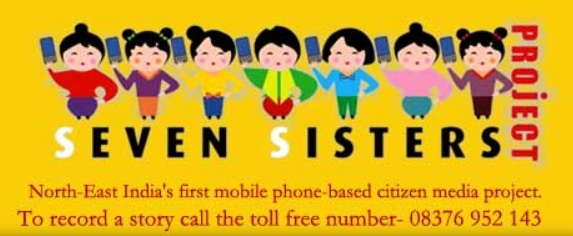A phone call away
Hansika Chopra
The Seven Sisters Project, aimed at bridging the information gap in the north-eastern States, uses the mobile phone to record stories on issues that concern and interest people of the region
“We came to this village in 1984. I was quite young at the time when I came with my parents and grandparents to settle in this area,” narrated Rajiv (name changed), an inhabitant of the Chakma settlement in Sibinosora in Mizoram. Residents of the settlement were forcefully evicted by prominent students’ bodies.
“In 1991, the State government introduced the New Land Use Policy (NLUP) programme for activities such as horticulture among many others. So the concerned village councils of Tlabung, and Lungsen had sought approval from the forest department to allow us to use these lands for these developmental projects under the NLUP programme. The then forest Minister, Mr. Zalawma, had ‘verbally’ allocated these areas…We toiled hard for many years and developed horticulture projects under the NLUP programme,” recounts Rajiv. Today, each of these projects is worth Rs. 20-25 lakh each. The evicted families have been forced to part with the hard work of over two decades and are struggling for a roof over their heads.
Rajiv’s story was recorded on telephone at the Seven Sisters Project’s toll free helpline number. Many such stories are finding an outlet thanks to the project which is a first of a kind cell-phone based revolution, aimed at bridging the information gap for the people living in the seven states of north-east India.
Although the dearth of access to traditional media in the north-east has caused information gaps, the region has witnessed a massive cell phone and social media revolution. Making use of cell phone penetration, the project has introduced a toll free number (08376952143) where anyone from the seven states can call and record their reports or listen to previously recorded messages and comment on them, hence facilitating awareness among residents across the region. The functioning of the project combines an interactive voice response system and the use of its Facebook page to create a mobile reporting network throughout the north-east region. The reports are filtered by a moderator and are published through the Seven Sisters Project’s website (www.sevensistersproject.org), Facebook page, Twitter handle and Soundcloud.
Shibayan Raha, founder of the project, who was infuriated by the indifferent approach of the central government and fellow Indians towards the north-east, says, “I realised if we can somehow connect people with a platform where they can call a toll free number to record their opinion/stories on issues they care about, then we will be able to at least make an effort to bridge this information gap.” The project uses an open source voice portal technology where the callers can record and listen to messages.
Like Rajiv, Meera, a Chakma refugee staying in Sakunalla, Diyun (Arunachal Pradesh) recorded her story on the helpline about her daughter Aleesha- born at Diyun Health Centre in 2011, who has not been issued a birth certificate.
Another woman in Thwaichung, Mizoram reported that the only source of drinking water for 41 families of her village is a tap that provides water once a week for 30 minutes. Other days of the week people have to walk to a small stream to collect drinking water that is not fit for human consumption. Similar stories of environmental degradation leading to soil erosion and dislocation of families have also come to light.
According to Shibayan, many stories expressing their support and demand for Gorkhaland are being recorded, and have increased in frequency ever since the State government has cut the cable TV supply in the region.
Prabhat Giri from Sikkim University on behalf of the Gorkha students in the University recorded a message on the helpline, urging the politicians who took part in the all-party meeting on August 16 in Darjeeling to take note that four generations have gone unheard while demanding a separate land for the Gorkhas.
The project receives almost daily reports from across the region and has become a beacon of hope for many. “What started as an idea has now gone to become a window for people who had no other means to talk about their issues. The Seven Sisters Radio has now become a source of information gathering, sharing and disseminating for people in these regions,” says Shibayan who is currently planning to take the model to Ladakh.
Read original story here



